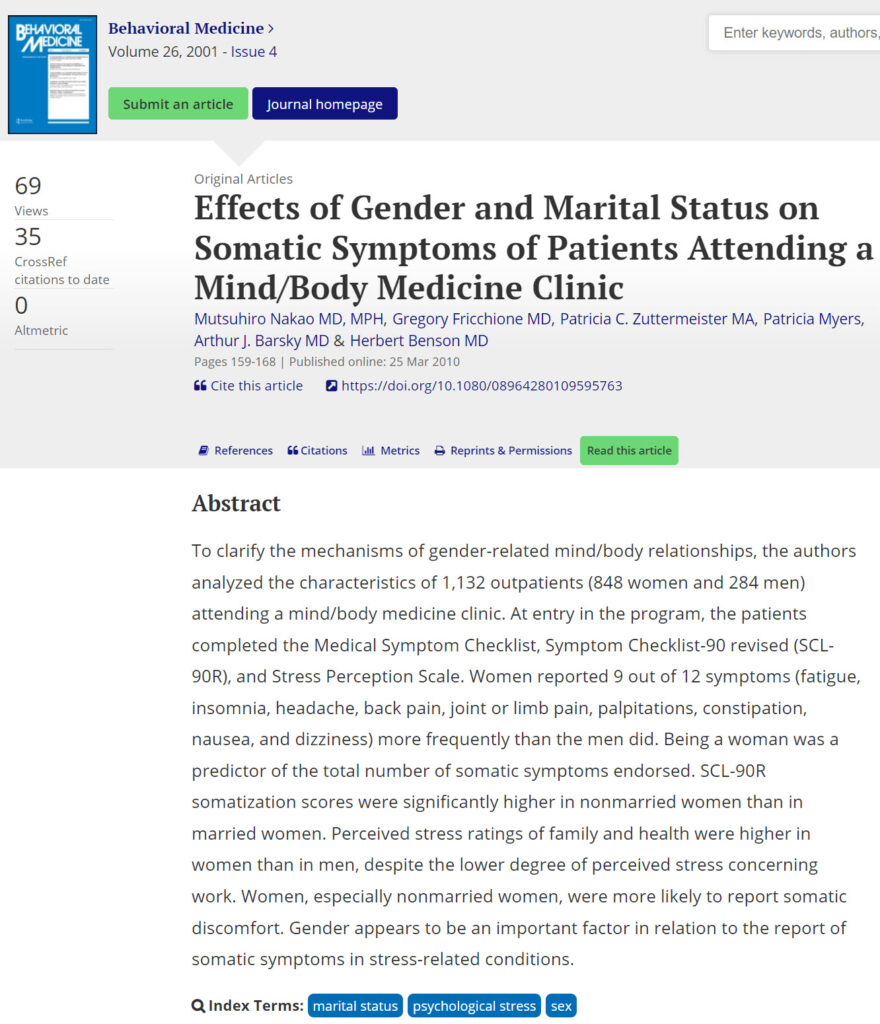To clarify the mechanisms of gender-related mind/body relationships, the authors analyzed the characteristics of 1,132 outpatients (848 women and 284 men) attending a mind/body medicine clinic. At entry in the program, the patients completed the Medical Symptom Checklist, Symptom Checklist-90 revised (SCL-90R), and Stress Perception Scale. Women reported 9 out of 12 symptoms (fatigue, insomnia, headache, back pain, joint or limb pain, palpitations, constipation, nausea, and dizziness) more frequently than the men did. Being a woman was a predictor of the total number of somatic symptoms endorsed. SCL-90R somatization scores were significantly higher in nonmarried women than in married women. Perceived stress ratings of family and health were higher in women than in men, despite the lower degree of perceived stress concerning work. Women, especially nonmarried women, were more likely to report somatic discomfort. Gender appears to be an important factor in relation to the report of somatic symptoms in stress-related conditions.
Effects of gender and marital status on somatic symptoms of patients attending a mind/body medicine clinic
Publication
Behavioral Medicine
Volume 26, Issue 4, pp 159-168
Abstract
Web and Email Links
Related Listings
Journal
IEEE Access
Relaxation helps to reduce physical, mental, and emotional pressure. Relaxation techniques generally enable a person to obtain calmness and well-being by reducing stress, anxiety, or anger. When a person becomes calm the body reacts physiologically, producing the so-called Relaxation Response (RResp) which affects the organism in a positive manner, no matter if it is during a state of relaxation or in the middle of a stressful period. The goal of this paper is to design a system capab […]
Journal
PLOS ONE
Background Poor psychological and physical resilience in response to stress drives a great deal of health care utilization. Mind-body interventions can reduce stress and build resiliency. The rationale for this study is therefore to estimate the effect of mind-body interventions on healthcare utilization. Objective Estimate the effect of mind body training, specifically, the Relaxation Response Resiliency Program (3RP) on healthcare utilization. Design Retrospective controlled […]
Journal
International Journal of Cardiology
We report extremely prominent heart rate oscillations associated with slow breathing during specific traditional forms of Chinese Chi and Kundalini Yoga meditation techniques in healthy young adults. We applied both spectral analysis and a novel analytic technique based on the Hilbert transform to quantify these heart rate dynamics. The amplitude of these oscillations during meditation was significantly greater than in the pre-meditation control state and also in three non-meditation […]

